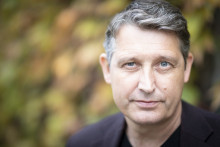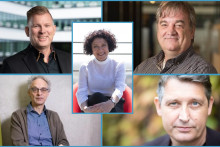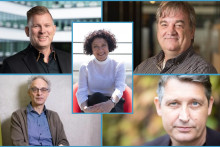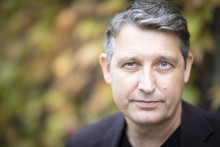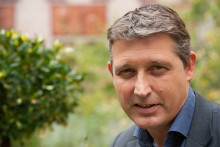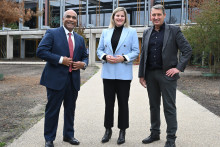Van der Meer’s research group is trying to determine whether certain regions are potential application areas for geothermal heat as an energy source. This is done with a combination of satellite information and fieldwork. The resulting data is entered into geological models. ‘That allows us to predict the potential of geothermal energy with an ever-increasing degree of accuracy,’ Van der Meer says. ‘It is a complex situation. You want to know how deep you have to drill into the ground, but also what layers of the Earth you will encounter on the way down.’
His department mainly focuses on volcanic regions in places where the continents are drifting apart. ‘Those offer the most potential,’ the researcher explains. That does not mean that this technology cannot be put to good use in the Netherlands. ‘Extracting geothermal heat from the Earth is not that different from the geothermal heat pumps that are used in our country,’ he says, ‘although the scale is entirely different, of course.’
Freek van der Meer in a nutshell
1989 Graduated from the VU, geology
1995 Obtained a doctoral degree at WUR in remote sensing
1999 Professor of Spectroscopy at TU Delft
2004 Professor at ITC
2004 Part-time professor at UU
2011 Editor-in-Chief of the International Journal of Applied Earth Observation and Geoinformation
2011 Member of the ITC’s Faculty Management Team
2018 Education portfolio manager ITC-UT
Cultural dynamic
At the moment, major projects are underway in Indonesia, Kenya and Tanzania. The dynamic in those countries is entirely different from that in the Netherlands. ‘Take Kenya, for example,’ Van der Meer says. ‘It is an extraordinary country where geothermal heat has been a viable solution for decades. Fifty percent of its energy demand comes from geothermal heat, and in total, eighty percent of its energy supply is sustainable. We have been active in Indonesia for around ten years or so.’
The differences are vast. ‘Mostly in terms of culture,’ the researcher says. ‘In Kenya, an entire infrastructure has been built around the extraction of geothermal heat. That is nothing like the situation in Indonesia, which is much more fragmented in an administrative and cultural sense. There are countless religions, some of which consider the land and mountains to be sacred. That means you have to talk endlessly to get anywhere.’

Added to that is the fact that things went disastrously wrong around ten years ago when a mud volcano was struck in Indonesia. ‘Entire villages were wiped out,’ Van der Meer says. ‘It was clear that this was not a desirable situation.’ He sees that same sentiment in the Netherlands. Shale gas, storing carbon dioxide; it all sounds great on a technical level. ‘Yet these developments are about more than just technology. You inevitably touch on some major social concerns. Along the way, I learned that I enjoy taking part in these discussions – with politicians and policy makers, but also with the general population.’
Social discussion
That social discussion is in full swing. Most people agree that the Netherlands must ultimately abandon the use of natural gas. That means other energy sources will be needed. ‘Geothermal heat is an option,’ the professor says. However, he is careful not to speak too highly about his field of study. ‘There is still much we do not know. The same goes for geothermal heat. How sustainable is it, really? Extracting geothermal heat from the ground is less invasive than drilling for oil or gas, but what about the long-term consequences? Those are still unknown. Is geothermal energy a perpetuum mobile, a device that moves of its own volition and generates energy out of thin air? I do not think so.’
The search for alternatives to fossil fuels is a costly business. Similar to the development of a wind turbine park, the installations used to extract geothermal heat cost millions. ‘On top of that, you only have a fifty percent chance of hitting the jackpot in most volcanic regions, even after thoroughly studying the region’s potential,’ Van der Meer continues. ‘Who would want to take that financial risk? A government on its own will be hesitant to take the leap.’

As a result, these large-scale projects almost always take the form of public-private partnerships. Van der Meer plays the role of project leader in society, for example in Tanzania. It requires him to fly all over the world. ‘In Indonesia, one of our goals is to get Dutch businesses involved in the project. That is quite a unique job for a scientist.’
As a researcher, he gets a lot out of this collaboration. ‘By being involved in its execution, we can determine how the drilling process affects the soil. We can use the resulting data in our models.’ It is a ‘tense’ collaboration. ‘The researchers are mostly interested in the long term and want to feed quality data into their models. Businesses tend to adopt a more limited perspective: when will they start to see a return on their investment? I enjoy the interplay between these perspectives.’
Entrepreneurship
That is also why Van der Meer views the collaboration between the ITC institute and the University of Twente as an excellent development. ‘ITC was originally a training and research institute. We can benefit enormously from the UT’s more than fifty years of experience as an entrepreneurial university. I experience that in my work every day. For example, I have ten PhDs working on one project. Three of them have moved away from their original field of expertise to focus mostly on governance and environmental impact. We are still learning the entirely new language that comes with it.’
'In my own way – no matter how small – I am contributing to a better tomorrow'
This ties into the new direction that the ITC is heading towards with its Capacity Development. ‘It is a major aspect of our faculty. In those underdeveloped regions, we want to acquire knowledge and experience alongside local partners, so we can help organisations together. That is what makes my job so much fun. It is more than just science; in my own way – no matter how small – I am contributing to a better tomorrow.’
In that sense, Van der Meer would like energy to be a more prominent theme at the UT. ‘We are working on that together, though. Across the UT, we are doing a lot in this regard,’ he says. ‘At ITC, but also in fields of research such as making systems more energy efficient, storage and in industrial processes. The energy transition is a major talking point in political circles and in society in general. We can contribute to that discussion.’
Building the future
To Van der Meer, it is important that his work lets him build the society of the future. That does not mean that his career has been a straight path leading him to where he is today. ‘As a high-school student, I was not sure what to do. I was good at the science subjects, but I wanted more than just theory. I eventually ended up at the Vrije Universiteit’s Earth Sciences programme.’

‘After my studies, I began my career in the world of business at a company that conducts geophysical research,’ he continues. ‘I soon grew tired of that. We had to churn out reports quickly. Above all, they had to support the client’s perspective and be open to interpretation. When I received an offer to work as a lecturer, I accepted immediately. I realised that I had to obtain a doctoral degree if I wanted to advance my career. I did that in Wageningen. I finally started working at ITC back in 2004. Originally, I expected to work here for a few years at most. Things turned out differently and I still love my job very much.’
'I am not going to solve all of the world’s problems, but I do believe my work is meaningful.'
These days, he is less involved in the primary scientific process. Van der Meer supervises his research group, has served as education portfolio manager since September and is in charge of several projects. He is also the editor-in-chief of the International Journal of Applied Earth Observation and Geoinformation. ‘I have plenty to do,’ he says. ‘I enjoy that very much. Of course, I am not going to solve all of the world’s problems, but I do believe my work is meaningful. Do I have a goal for my future? No, I am satisfied with where I am and I love working with the enthusiastic people around me, whether that be in the context of the partnerships or with young researchers. It is wonderful to watch talent develop. That is what drives me.’
You can also find this story in the latest Science & Technology Magazine. You can grab a printed copy on campus or view the magazine here.


